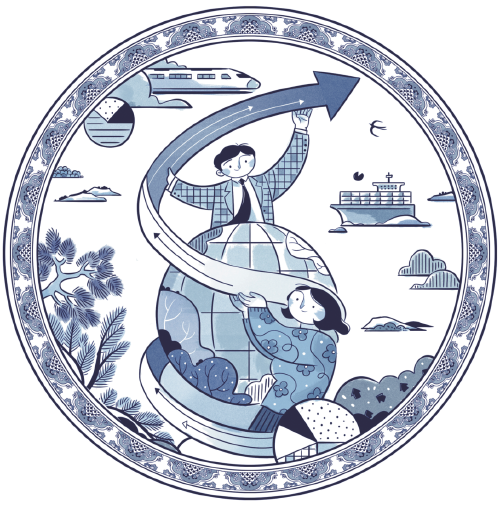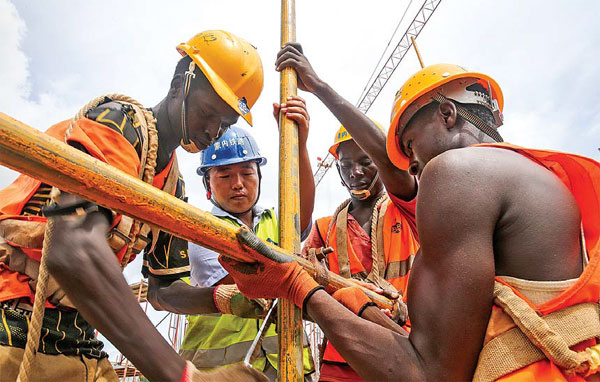2022年3月4日,华东师范大学外语学院国别与区域研究所副所长、亚洲和太平洋地区研究中心执行副主任陈晓晨接受《中国日报》“两会”专版采访,谈国际社会应共同聚力落实“全球发展倡议”。
Discussions expected to focus on strategies to ensure sustainable growth.

As the two sessions, the major event in China's political calendar, begin, the international community is looking forward to seeing how the world's largest developing country plans to advance global development when the world faces multiple pressing challenges, observers and experts said.
It is expected that China will continue to facilitate the sustainable growth of developing countries by implementing its own development strategies, particularly the Global Development Initiative, they said.
During the annual meetings of the National People's Congress and the National Committee of the Chinese People's Political Consultative Conference, thousands of national lawmakers and political advisers will set the tone for the way forward in every aspect of China's development and the people's well-being.
Common aspirations
Last year, President Xi Jinping proposed the Global Development Initiative at the 76th Session of the United Nations General Assembly.
He called on countries to work together to overcome the impact of the COVID-19 pandemic on global development, to accelerate implementation of the 2030 Agenda for Sustainable Development and to build a global community of development with a shared future.
Wang Hongxin, head of the Academy for Global Development at Beijing Normal University, said, "The GDI responds to the common aspirations of the international community, especially many developing countries, and points the way forward for global development."
He added that the initiative also shows China's strategic vision for global development and adds confidence and positive energy for other countries to jointly overcome the current difficulties.
According to the Ministry of Foreign Affairs, the GDI has been warmly received by the international community as nearly 100 countries and many international organizations, including the UN, have expressed support.
Antonio Guterres, UN secretary-general, has said the announcement of the GDI brought forward new potential in its deep alignment with the UN Sustainable Development Goals for 2030.
In October, Guterres said the UN stands ready to support implementation of the GDI and provide technical assistance to ensure compliance with recognized international norms and standards.
Chen Xiaochen, executive deputy director of the Centre for Asia Pacific Studies at East China Normal University in Shanghai, said, "The pandemic, together with changes unseen in a century, has caused a direct negative impact on the UN 2030 Agenda and also aggravated the 'development deficit' that already existed."
According to the Sustainable Development Goals Report 2021, published by the UN, progress slowed in terms of achieving all 17 SDGs-such as eradicating poverty, zero hunger and reduced inequalities-in 2020, as the world entered the second year of the COVID-19 pandemic.
Estimates from the report suggest that in 2020, an additional 119 to 124 million people were pushed back into extreme poverty globally, while an additional 83 to 132 million were likely to have experienced hunger as a result of the pandemic.
"The figures mean that global efforts to alleviate poverty over the past decade have been swallowed up, and the 2030 Agenda is in danger of stagnating, moving backward or even falling apart," Chen said, noting that the most urgent task now faced by many developing countries is to beat the pandemic and restore economic growth.
"The GDI is the approach provided by China to reinvigorate global development, and the international community should join hands and work together to put this initiative in place," he added.
In January, China launched the Group of Friends of the GDI at the UN headquarters in New York.
Speaking at the launch meeting, attended by delegates from over 100 countries, Zhang Jun, China's permanent representative to the UN, said the country looks forward to working with all parties to implement the GDI, seizing opportunities and meeting challenges together.
"In the new year, we hope to work with other group members to closely integrate the implementation of the initiative with the UN development agenda through thematic activities and exchanges, and to help countries achieve common, transformative and green development," Zhang said.

Kenyan workers and a Chinese engineer work together on construction of the railway between Mombasa and Nairobi in Kenya. [Photo by Pan Siwei/For China Daily]
Public good
Foreign Ministry spokesman Zhao Lijian said the grand launch of the Group of Friends eloquently proved that the GDI is widely supported by all parties.
"The active participation in the Group of Friends by high-profile figures from the international community fully shows that the GDI's core concept is based on wide international consensus, its key areas of cooperation are in line with the priority of the parties and that its great potential in promoting the implementation of the 2030 Agenda is recognized by all," he said.
"The GDI was put forward by China, but it belongs to the world," Zhao said, adding that going forward, China will continue to hold various activities under the framework of the Group of Friends to accelerate the implementation of the 2030 Agenda, further build international consensus and chart a course for practical cooperation.
Speaking at the virtual session of the 2022 World Economic Forum in January, Xi said the GDI is a public good that is open to the whole world and aims to form synergy with the 2030 Agenda for Sustainable Development and boost common development across the world.
"China stands ready to work with all partners to jointly translate the initiative into concrete actions and make sure that no country is left behind in this process," he said.
As Xi stressed when he put forward the initiative, the GDI should care about the special needs of developing countries, particularly vulnerable ones that face exceptional difficulties.
According to the UN, three groups of countries – namely the 46 least-developed countries, 32 landlocked developing countries and 38 small island developing states – are particularly vulnerable to external shocks, given their limited means to respond.
Chen, from East China Normal University, said: "An important element of the GDI is that it should stay committed to benefits for all, but with an emphasis on developing countries. This is the only way to bridge the developmental divide and revitalize global development."
He said the three groups of vulnerable countries are increasingly likely to be left behind amid the pandemic, but "China has not simply put forward the initiative, but has implemented the GDI with actions prioritizing these countries".
On Oct 21, the first meeting of foreign ministers from China and Pacific Island Countries was held via video link. During the meeting, representatives of the Pacific Island countries expressed their support for the GDI and their hope for strengthened exchanges on governance with China, deeper cooperation on the Belt and Road Initiative and enhanced solidarity in fighting COVID-19, the Foreign Ministry said.
African countries' support for the GDI was stated in the Dakar Declaration and the FOCAC Dakar Action Plan, two documents released after the Eighth Ministerial Conference of the Forum on China-Africa Cooperation held in Dakar, Senegal, in November.
In an interview, Jean-Claude Gakosso, foreign minister of The Republic of the Congo, said China is a country that "has always had a listening ear for its friends" and expressed his appreciation for "the promptness that China has shown in the distribution of vaccines against COVID-19".

The first cargo train on China-Lao railway pulls out of the Xiaonanya railway logistic center in Southwest China's Chongqing on March 2. With the opening of the China-Lao railway to traffic, cargo transportation time from Chongqing to Vientiane has shrunk to about five days from 10. [Photo/Xinhua]
Growing support
Wang Youming, director of the Institute of Developing Countries at the China Institute of International Studies in Beijing, said the growing trust and support for China expressed by many developing countries can be attributed to two major things.
"One is the remarkable achievements that China has made in reform and opening-up," he said, noting that China's experiences could be of reference value to other developing countries.
After over 40 years of continuous endeavor, more than 700 million people in China have been lifted out of extreme poverty, accounting for more than 70 percent of global poverty reduction.
In 2020, China lifted all its 98.99 million rural residents living below the current poverty line out of poverty. It also met the poverty eradication target set out in the 2030 Agenda for Sustainable Development 10 years ahead of schedule.
China is committed to a people-centered approach in pursuing its development, and this is widely echoed by other developing countries, Wang said, adding that the other reason for great trust in China is the unique appeal of major-country diplomacy with Chinese characteristics.
Zoon Ahmed Khan, a Pakistani scholar with the Center for China and Globalization in Beijing, said that instead of unilaterally determining the needs of other countries, China is working as an equal partner to mutually discover possible ways forward through cooperation with other countries.
For example, she said that during the joint building of the BRI, China offers its expertise to developing countries, and also helps them meet their domestically determined development needs-free from moralizing and ideology.
"This is in itself an empowering and transformative approach, which has enhanced the agency of developing countries across the world," she said.
The BRI is dedicated to advancing policy, infrastructure, trade, financial and people-to-people connectivity, while also fostering new growth drivers in the health, green economy and digital sectors, among other things.
As of last month, 148 countries and 32 international organizations were participating in the BRI, with more than 200 cooperation documents being signed, according to the Foreign Ministry.
In December, the China-Laos Railway-a docking project between the BRI and Laos' strategy to convert the landlocked country into a land-linked hub-was officially declared operational, leading Laos to the massive markets of its neighboring countries.
At the opening ceremony, Lao President Thongloun Sisoulith hailed the railway as an important milestone in his country's modern infrastructure construction and said it will greatly promote national socioeconomic development.